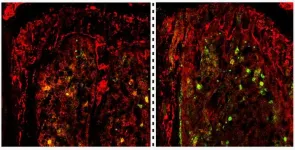New research: Political attitudes did not change during COVID-19 pandemic
2023-08-17
(Press-News.org)
EAST LANSING, Mich. – There is a traditional understanding that if someone experiences a threatening event, their attitudes and beliefs will change. Some scholars predict that a threat will cause someone to become more conservative on a variety of issues or that they will become more extreme in their attitudes. However, a new study from researchers at Michigan State University and Tilburg University found that Americans’ political attitudes did not change significantly during the onset of the COVID-19 pandemic, contrary to what many expected.
“The onset of the pandemic was a major event that affected nearly every aspect of life. Political attitudes are often attitudes about how society should work and the rules and procedures that best guide society. One intuitive prediction is that if society changes, our political attitudes should also change,” said Mark Brandt, a researcher and associate professor of psychology at MSU. “But that didn’t happen. This suggests that people’s attitudes are pretty resistant to changes, even when the conditions of society radically change.”
With more than 2,000 people surveyed, the study is the most comprehensive analysis of attitude change in response to the COVID-19 pandemic and, possibly, to any major societal event that ever has been conducted. Data collected during the two different studies examined 84 different attitudes in all, including attitudes toward economic stimulus, unemployment benefits and trade with China. Researchers collected the data between spring of 2019 and the end of May 2020. To make visible day-to-day changes in attitudes across the timeframe, the team collected data weekly for one study and every other week for the second study.
Across the 84 attitudes, only 18 shifted in either the conservative or liberal direction — and these changes were small. For example, 3.5% of respondents did become more opposed to trade with China, while 11% of people became more supportive of unemployment benefits, and 14% became supportive of economic stimulus.
“We hope that this study helps social scientists understand how attitudes respond to real-world events so they can make better predictions in the future,” said Brandt. “We also hope that this information helps people recognize how difficult attitude change can be. Things like attitude and cultural change do not seem to be the product of one large event but, instead, take time, effort and coordination among people from across society.”
By Shelly DeJong
###
Michigan State University has been advancing the common good with uncommon will for more than 165 years. One of the world's leading research universities, MSU pushes the boundaries of discovery to make a better, safer, healthier world for all while providing life-changing opportunities to a diverse and inclusive academic community through more than 400 programs of study in 17 degree-granting colleges.
For MSU news on the Web, go to MSUToday. Follow MSU News on Twitter at twitter.com/MSUnews.
END
ELSE PRESS RELEASES FROM THIS DATE:
2023-08-17
FINDINGS
Scientists at City of Hope, one of the largest cancer research and treatment organizations in the United States, have identified how low levels of the TET2 gene fuel the rapid growth of acute myeloid leukemia in animal models. Cell Stem Cell recently published the study.
A team led by Jianjun Chen, Ph.D., the Simms/Mann Family Foundation Chair in Systems Biology at Beckman Research Institute of City of Hope, found that TET2 deficiency sets off a cascade of biochemical changes that enhance the bone marrow cancer’s ability to spread. These changes ...
2023-08-17
The U.S. Department of Energy’s Argonne National Laboratory has named Sean Jones as deputy laboratory director for science and technology. Jones will begin his new role on October 9, serving as Argonne’s senior science strategist, advisor and chief research officer.
Jones will join Argonne from the National Science Foundation (NSF). In his current role as Assistant Director of the NSF’s Mathematical and Physical Sciences directorate, he oversees a $1.86 billion portfolio that includes five science divisions, domestic and international research facilities, and ...
2023-08-17
Julie Carrier, professor and head of the University of Tennessee Department of Biosystems Engineering and Soil Science, was awarded the James R. and Karen A. Gilley Academic Leadership Award during the annual international meeting of the American Society of Agricultural and Biological Engineers (ASABE) in July.
The award was given in recognition of Carrier’s exceptional leadership as department head as well as her ongoing dedication to furthering the UT Institute of Agriculture’s mission to provide research and extension ...
2023-08-17
PITTSBURGH, Aug. 17, 2023 – Patients with cancer who live in rural Pennsylvania counties appear to know that they may have better outcomes if they receive their cancer surgery at a hospital that performs a high volume of those surgeries, but still opt for lower volume hospitals closer to home when their cancer is likely less complex, according to a new analysis published today in JCO Oncology Practice by health policy scientists at the University of Pittsburgh School of Public Health.
With a shortage of experienced surgeons in rural America and rural ...
2023-08-17
Gut microbiome variation associated with race and ethnicity arises after three months of age and persists through childhood, according to a new study published August 17th in the open access journal PLOS Biology by Elizabeth K. Mallott of Washington University in St. Louis, US, Seth Bordenstein of Pennsylvania State University, US, and colleagues.
Human microbiome variation has been linked to the incidence, prevalence and mortality of many diseases and is known to associate with race and ethnicity in the United States. However, in this context race and ethnicity are considered proxies for inequitable exposure to social and environmental determinants of health due to structural racism. ...
2023-08-17
Environmental regulators and other organizations should do more scientific experimentation to inform natural resource policy, according to an international group of economists that includes University of Wyoming researchers.
In a new paper in the prestigious journal Science, the economists say more frequent use of up-front experiments would result in more effective environmental policymaking in areas ranging from pollution control to timber harvesting across the world.
“Although formal experimentation is a cornerstone of science and is increasingly embedded in nonenvironmental social programs, it is virtually absent in environmental ...
2023-08-17
The city of Gatineau is planning a tramway network that will link up with Ottawa, where the Light Rail Transit (LRT) continues to be bogged down by major mishaps. With Montreal’s new Réseau express métropolitain (REM) light transit system experiencing its own hiccups to start, how can cities looking to incorporate mass transport systems successfully launch such endeavors while avoiding project failures and years of misfortune?
New research from a University of Ottawa professor suggests project leaders not overlook the “F” word.
Telfer School of Management professor Lavagnon Ika found a lack of full appreciation ...
2023-08-17
Almost 66 million years ago, an asteroid struck the Earth, killing all non-avian dinosaurs and allowing mammals to dominate.
But just how did we evolve from rat-like creatures running between the feet of dinosaurs to take over their ecological niches? Dr. Kendra Chritz, assistant professor in the UBC department of earth, ocean and atmospheric sciences, aims to find out.
Dr. Chritz is co-leading a new multi-million-dollar research project to learn how ecosystems and organisms recover after a catastrophic, climate-changing event. She explains in this Q&A that clues may lie in the fossilized teeth of mammals.
Why don’t we know much about how mammals ...
2023-08-17
Scientists have discovered an additional potential cause of the genetic mutations that result in rare conditions such as Huntington’s disease (HD).
The neurodegenerative diseases, which also include most spinocerebellar ataxias (SCAs), are known to be caused by an expansion in the CAG (cytosine-adenine-guanine) repeats within a gene that in turn leads to an expanded polyglutamine (polyQ) tract in a protein.
Such diseases are inherited, given that the expansion of CAG repeats in a gene can be passed down the generations.
Previously, it had been thought the damage in these genetic diseases was caused solely by increased protein aggregate toxicity.
However, ...
2023-08-17
ITHACA, N.Y. -- Current methods can vastly overestimate the rates that malaria parasites are multiplying in an infected person’s blood, which has important implications for determining how harmful they could be to a host, according to a new report.
The findings also have consequences for understanding the evolution of traits that lead to drug resistance, how quickly a parasite might spread through a population, and for evaluating the effectiveness of new vaccines.
The study, “Extraordinary Parasite Multiplication Rates in ...
LAST 30 PRESS RELEASES:
[Press-News.org] New research: Political attitudes did not change during COVID-19 pandemic




